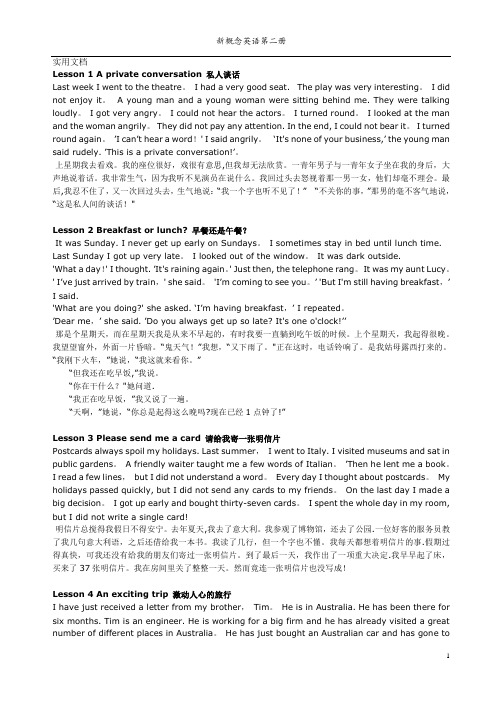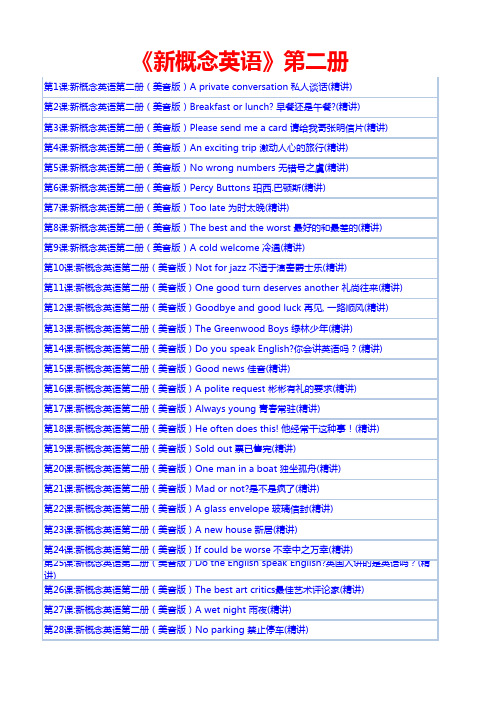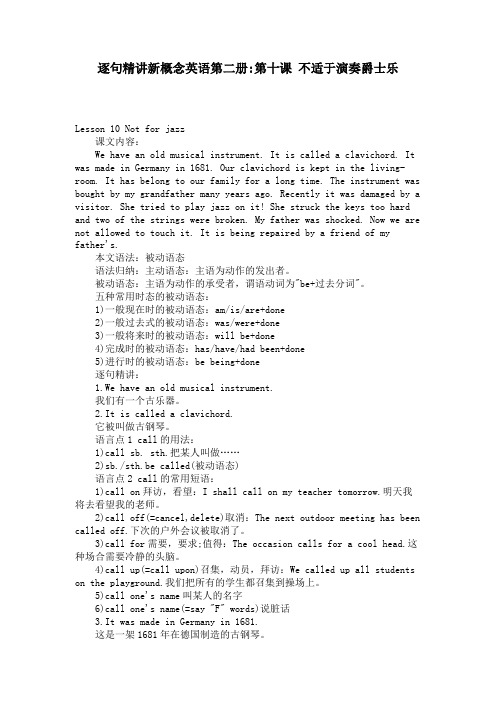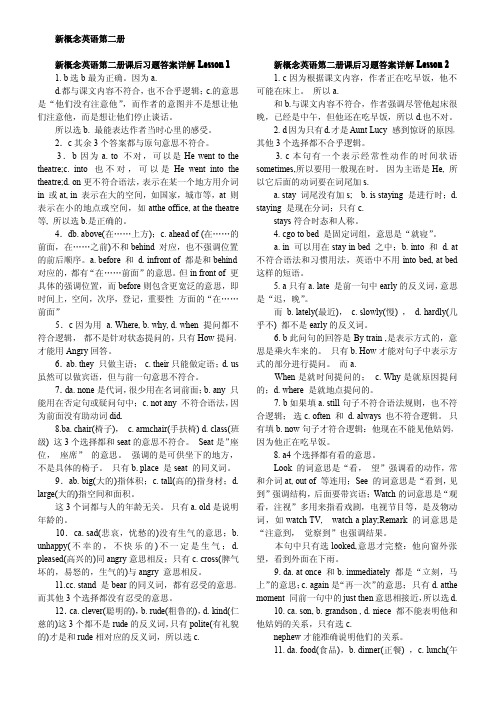新概念英语第二册第9-10课.doc
新概念英语第二册课文(中英文对照)

Lesson 1 A private conversation 私人谈话Last week I went to the theatre。
I had a very good seat. The play was very interesting。
I did not enjoy it。
A young man and a young woman were sitting behind me. They were talking loudly。
I got very angry。
I could not hear the actors。
I turned round。
I looked at the man and the woman angrily。
They did not pay any attention. In the end, I could not bear it。
I turned round again。
’I can’t hear a word!' I said angrily。
‘It's none of your business,’ the young man said rudely. ’This is a private conversation!’。
上星期我去看戏。
我的座位很好,戏很有意思,但我却无法欣赏。
一青年男子与一青年女子坐在我的身后,大声地说着话。
我非常生气,因为我听不见演员在说什么。
我回过头去怒视着那一男一女,他们却毫不理会。
最后,我忍不住了,又一次回过头去,生气地说:“我一个字也听不见了!” “不关你的事,”那男的毫不客气地说,“这是私人间的谈话!"Lesson 2 Breakfast or lunch? 早餐还是午餐?It was Sunday. I never get up early on Sundays。
I sometimes stay in bed until lunch time. Last Sunday I got up very late。
新概念英语第二册课文+练习 Lesson 10

Lesson 10 Not for jazz 不适于演奏爵士乐We have an old musical instrument. It is called a clavichord. It was made in Germany in 1681. Our clavichord is kept in the living room. It has belonged to our family for a long time. The instrument was bought by my grandfather many years ago. Recently it was damaged by a visitor. She tried to play jazz on it! She struck the keys too hard and two of the strings were broken. My father was shocked. Now we are not allowed to touch it. It is being repaired by a friend of my father’s.Comprehension1 The old musical instrument ________(a) has been in the family for a long time (b) was bought recently(c) was sold recently (d) was repaired recently2 How did the visitor damage the clavichord(a) She played jazz on it. (b) She played it.(c) She cut the strings. (d) She hit the keys too hard. Structure3 Our c1avichord is kept in the living room. That’s where we ______ it.(a) kept (b) have kept (c) are keeping (d) keep4 It has belonged to our family for years. It’s the _______(a) families (b) families’(c) family’s (d) familys’5 The family have had the clavichord ______ many years.(a) since (b) for (c) from (d) by6 Who _______ it Grandfather did.(a) buy (b) was bought (c) bought (d) did buy7 We are not allowed to touch it. We ______ touch it.(a) mustn’t (b) mustn’t to (c) haven’t to (d) don’t have to Vocabulary8 What’s it ______ A clavichord.(a) told (b) said (c) called (d) spoken9 It’s kept in the living room. That’s where we _______ it.(a) have (b) hold (c) lift (d) carry10 The visitor damaged it. She _______ it.(a) hurt (b) pained (c) broke (d) destroyed11 Recently it was damaged. She damaged it ______(a) late (b) lastly (c) lately (d) finally12 A friend of my father’ s is ______ the clavichord.(a) mending (b) making (c) doing (d) buildingNew words and expressions 生词和短语jazz n. 爵士音乐musical adj. 音乐的instrument n. 乐器clavichord n. 古钢琴recently adv. 最近damage v. 损坏key n. 琴键string n. (乐器的)弦shock v. 使不悦或生气,震惊allow v. 允许,让touch v. 触摸。
最新新概念英语第二册第十课课后习题答案

新概念英语第二册课后习题答案详解Lesson 101.a 根据课文第3行It has belonged to our family for a long time. 只有a. has beenin the family for a long time 是正确的,其他3个选择都不符合课文内容。
2.d根据课文中第5-6行She struck the keys too hard and two of the strings werebroken, 只有d. She hit the keys too hard 最符合课文内容。
A. She played jazzon it 是事实,但是不能具体说明钢琴损坏的原因;b. she played it 更不能说明钢琴损坏的原因;c. She cutthe strings 与事实不符合。
3. d 本句需要选同前面句子中的is kept 相应的主动语态形式。
a. kept 是过去式,b. have kept 是现在完成时形式,c. are keeping是现在进行时,这3个选择都在时态上与is kept 不符合。
只有d. keep 是一般现在时形式,与is kept时态一致,所以选d.4. c 本句需要选名词的所有格形式。
a. families 是复数形式,而不是所有格形式;b. families’是所有格形式,但不应该是复数;d. familys’写法错误;只有c. family’s 是所有格形式,最符合标准。
5. b a. since c. from d. by 都不能用来引导表示一段时间的短语,都不能用在many years 前,只有b. for可以引导表示一段时间的短语,所以选b.6. c这个问句的回答是Grandfather did, 是一般过去时,需要为疑问句选一个过去式的动词。
A. buy 是现在式;b. wasbought 是过去式,但语态不对; d. did buy 用Who提问时不应该用助动词did; 只有c. bought是过去式,最符合语法。
《新概念英语》第二册 电子版

《新概念英语》第二册第1课:新概念英语第二册(美音版)A private conversation 私人谈话(精讲)第2课:新概念英语第二册(美音版)Breakfast or lunch? 早餐还是午餐?(精讲)第3课:新概念英语第二册(美音版)Please send me a card 请给我寄张明信片(精讲)第4课:新概念英语第二册(美音版)An exciting trip 激动人心的旅行(精讲)第5课:新概念英语第二册(美音版)No wrong numbers 无错号之虞(精讲)第6课:新概念英语第二册(美音版)Percy Buttons 珀西.巴顿斯(精讲)第7课:新概念英语第二册(美音版)Too late 为时太晚(精讲)第8课:新概念英语第二册(美音版)The best and the worst 最好的和最差的(精讲)第9课:新概念英语第二册(美音版)A cold welcome 冷遇(精讲)第10课:新概念英语第二册(美音版)Not for jazz 不适于演奏爵士乐(精讲)第11课:新概念英语第二册(美音版)One good turn deserves another 礼尚往来(精讲)第12课:新概念英语第二册(美音版)Goodbye and good luck 再见, 一路顺风(精讲)第13课:新概念英语第二册(美音版)The Greenwood Boys 绿林少年(精讲)第14课:新概念英语第二册(美音版)Do you speak English?你会讲英语吗?(精讲)第15课:新概念英语第二册(美音版)Good news 佳音(精讲)第16课:新概念英语第二册(美音版)A polite request 彬彬有礼的要求(精讲)第17课:新概念英语第二册(美音版)Always young 青春常驻(精讲)第18课:新概念英语第二册(美音版)He often does this! 他经常干这种事!(精讲)第19课:新概念英语第二册(美音版)Sold out 票已售完(精讲)第20课:新概念英语第二册(美音版)One man in a boat 独坐孤舟(精讲)第21课:新概念英语第二册(美音版)Mad or not?是不是疯了(精讲)第22课:新概念英语第二册(美音版)A glass envelope 玻璃信封(精讲)第23课:新概念英语第二册(美音版)A new house 新居(精讲)第24课:新概念英语第二册(美音版)If could be worse 不幸中之万幸(精讲)第25课:新概念英语第二册(美音版)Do the English speak English?英国人讲的是英语吗?(精讲)第26课:新概念英语第二册(美音版)The best art critics最佳艺术评论家(精讲)第27课:新概念英语第二册(美音版)A wet night 雨夜(精讲)第28课:新概念英语第二册(美音版)No parking 禁止停车(精讲)第29课:新概念英语第二册(美音版)Taxi! 出租汽车(精讲)第30课:新概念英语第二册(美音版)Football or polo? 足球还是水球?(精讲)第31课:新概念英语第二册(美音版)Success story 成功者的故事(精讲)第32课:新概念英语第二册(美音版)Shopping made easy 购物变得很方便(精讲)第33课:新概念英语第二册(美音版)Out of the darkness 冲出黑暗(精讲)第34课:新概念英语第二册(美音版)Quick work 破案 “神速”(精讲)第35课:新概念英语第二册(美音版)Stop thief!捉贼!(精讲)第36课:新概念英语第二册(美音版)Across the Channel 横渡海峡(精讲)第37课:新概念英语第二册(美音版)The Olympic Games 奥林匹克运动会(精讲)第38课:新概念英语第二册(美音版)Everything except the weather 唯独没有考虑到天气(精讲第39课:新概念英语第二册(美音版)Am I all right? 我是否痊愈?(精讲)第40课:新概念英语第二册(美音版)Food and talk 进餐与交谈(精讲)第41课:新概念英语第二册(美音版)Do you call that a hat? 你把那个叫帽子吗?(精讲)第42课:新概念英语第二册(美音版)Not very musical 并非很懂音乐(精讲)第43课:新概念英语第二册(美音版)Over the South Pole 飞越南极(精讲)第44课:新概念英语第二册(美音版)Through the forest 穿过森林(精讲)第45课:新概念英语第二册(美音版)A clear conscience 问心无愧(精讲)第46课:新概念英语第二册(美音版)Expensive and uncomfortable 既昂贵又受罪(精讲)第47课:新概念英语第二册(美音版)A thirsty ghost 嗜酒的鬼魂(精讲)第48课:新概念英语第二册(美音版)Did you want to tell me something? 你想对我说什么吗?第49课:新概念英语第二册(美音版)The end of a dream 美梦告终(精讲)第50课:新概念英语第二册(美音版)Taken for a ride 乘车兜风(精讲)第51课:新概念英语第二册(美音版)Reward for virtue 对美德的奖赏(精讲)第52课:新概念英语第二册(美音版)A pretty carpet 漂亮的地毯(精讲)第53课:新概念英语第二册(美音版)Hot snake 触电的蛇(精讲)第54课:新概念英语第二册(美音版)Sticky fingers 粘糊的手指(精讲)第55课:新概念英语第二册(美音版)Not a gold mine 并非金矿(精讲)第56课:新概念英语第二册(美音版)Faster than sound! 比声音还快!(讲解)第57课:新概念英语第二册(美音版)Can I help you, madam? 您要买什么,夫人?(精讲)第58课:新概念英语第二册(美音版)A blessing in disguise? 是因祸得福吗?(精讲)第59课:新概念英语第二册(美音版)In or out? 进来还是出去?(精讲)第60课:新概念英语第二册(美音版)The future 卜算未来(精讲)第61课:新概念英语第二册(美音版)Trouble with the Hubble 哈勃望远镜的困境(讲解)第62课:新概念英语第二册(美音版)After the fire 大火之后(精讲)第63课:新概念英语第二册(美音版)She was not amused 她并不觉得好笑(精讲)第64课:新概念英语第二册(美音版)The Channel Tunnel 海峡隧道(精讲)第65课:新概念英语第二册(美音版)Jumbo versus the police 小象对警察(精讲)第66课:新概念英语第二册(美音版)Sweet as honey! 像蜜一样甜!(精讲)第67课:新概念英语第二册(美音版)Volcanoes 火山(精讲)第68课:新概念英语第二册(美音版)Persistent 纠缠不休(精讲)第69课:新概念英语第二册(美音版)But not murder!并非谋杀!(精讲)第70课:新概念英语第二册(美音版)Red for danger 危险的红色(精讲)第71课:新概念英语第二册(美音版)A famous clock第72课:新概念英语第二册(美音版)A car called bluebird第73课:新概念英语第二册(美音版)The record-holder第74课:新概念英语第二册(美音版)Out of the limelight第75课:新概念英语第二册(美音版)SOS第76课:新概念英语第二册(美音版)April Fools Day第77课:新概念英语第二册(美音版)A successful operation第78课:新概念英语第二册(美音版)The last one?第79课:新概念英语第二册(美音版)By air第80课:新概念英语第二册(美音版)The Crystal Palace第81课:新概念英语第二册(美音版)Escape第82课:新概念英语第二册(美音版)Monster or fish?第83课:新概念英语第二册(美音版)After the elections第84课:新概念英语第二册(美音版)On strike第85课:新概念英语第二册(美音版)Never too old to learn第86课:新概念英语第二册(美音版)Out of control第87课:新概念英语第二册(美音版)A perfect alibi第88课:新概念英语第二册(美音版)Trapped in a mine第89课:新概念英语第二册(美音版)A slip of the tongue 第90课:新概念英语第二册(美音版)What第91课:新概念英语第二册(美音版)Three men in a basket 第92课:新概念英语第二册(美音版)Asking for trouble第93课:新概念英语第二册(美音版)A noble gift第94课:新概念英语第二册(美音版)Future champions第95课:新概念英语第二册(美音版)A fantasy第96课:新概念英语第二册(美音版)The dead return。
逐句精讲新概念英语第二册第十课 不适于演奏爵士乐

逐句精讲新概念英语第二册:第十课不适于演奏爵士乐Lesson 10 Not for jazz课文内容:We have an old musical instrument. It is called a clavichord. It was made in Germany in 1681. Our clavichord is kept in the living-room. It has belong to our family for a long time. The instrument was bought by my grandfather many years ago. Recently it was damaged by a visitor. She tried to play jazz on it! She struck the keys too hard and two of the strings were broken. My father was shocked. Now we are not allowed to touch it. It is being repaired by a friend of myfather's.本文语法:被动语态语法归纳:主动语态:主语为动作的发出者。
被动语态:主语为动作的承受者,谓语动词为"be+过去分词"。
五种常用时态的被动语态:1)一般现在时的被动语态:am/is/are+done2)一般过去式的被动语态:was/were+done3)一般将来时的被动语态:will be+done4)完成时的被动语态:has/have/had been+done5)进行时的被动语态:be being+done逐句精讲:1.We have an old musical instrument.我们有一个古乐器。
2.It is called a clavichord.它被叫做古钢琴。
新概念英语第二册第九课课件

• I refused his invitation.
• I was politely refused.
• ①refuse sth. 拒绝某物
•
She refuses my love.
• ②refuse to do 拒绝做…
•
She refuses to marry me.
• refusal: n.
Key structures
1. welcome to
2. the Town Hall
3. a large crowd of
4. gather, together 5. in twenty minutes’ time 表示时间的介词
(in, on, at, about, around) 6. 不定代词 nothing, something, anything,
•1、我们的市场行为主要的导向因素,第一个是市场需求的导向,第二个是技术进步的导向,第三大导向是竞争对手的行为导向。 •2、市场销售中最重要的字就是“问”。 •3、现今,每个人都在谈论着创意,坦白讲,我害怕我们会假创意之名犯下一切过失。 •4、在购买时,你可以用任何语言;但在销售时,你必须使用购买者的语言。 •5、市场营销观念:目标市场,顾客需求,协调市场营销,通过满足消费者需求来创造利润。2021年11月3日星期三 2021/11/32021/11/32021/11/3 •6、我就像一个厨师,喜欢品尝食物。如果不好吃,我就不要它。2021年11月2021/11/32021/11/32021/11/311/3/2021 •7、我总是站在顾客的角度看待即将推出的产品或服务,因为我就是顾客。2021/11/32021/11/3November 3, 2021 •8、利人为利已的根基,市场营销上老是为自己着想,而不顾及到他人,他人也不会顾及你。2021/11/32021/11/32021/11/32021/11/3
新概念 英语 第二册 第9课时

NCE2 Lesson 9 A cold welcome
(妙语佳句: I feel the same way. 我有同感。
1.spoil 2.public 3.friendly 4.waiter 5. whole 6.single 7.exciting 8.receive 9.firm / company 10.different 11.postcard 12.abroad 13.visit museums 14.teach me a few words of Italian 15.lend you a book 16.make a big decision 17.in the centre of Hangzhou 18.a great number of places 19.My brother has been in Australia for six
minutes' time.. 【语言点】"in"+一段时间可表示“一段时间 之内”;也可用于表示“一段时间之后”, 多用于将来时 ①在…内:The bird covered the distance in 3 minutes. 这只鸽子只用了3分钟就飞越 了这段距离。 ② 在…之后(多与将来时连用):I will come back in 5 days. 我将在5天后回来。
1、beggar 2、pocket 3、detective 4、airport 5、expect 6、valuable/precious 7、guard 8、 diamond 9、steal stole stolen 10、south Africa 11、take the parcel off the plane 12、 wait inside the main building 13、 the Customs House 14、 to their surprise 15、be full of stones and sand 16、knock at the door 17、ask for a glass of beer 18、in return for this 19、stand on one’s head 20、 He calls at every house in the street once a month.
新概念英语第二册课后习题答案详解_1-10

新概念英语第二册新概念英语第二册课后习题答案详解Lesson11.b选b最为正确。
因为a.d.都与课文内容不符合,也不合乎逻辑;c.的意思是“他们没有注意他”,而作者的意图并不是想让他们注意他,而是想让他们停止谈话。
所以选b.最能表达作者当时心里的感受。
2.c其余3个答案都与原句意思不符合。
3.b因为a.to不对,可以是He went to the theatre;c.into也不对,可以是He went into the theatre;d.on更不符合语法,表示在某一个地方用介词in或at,in表示在大的空间,如国家,城市等,at则表示在小的地点或空间,如atthe office,at the theatre 等,所以选b.是正确的。
4.db.above(在……上方);c.ahead of(在……的前面,在……之前)不和behind对应,也不强调位置的前后顺序。
a.before和 d.infront of都是和behind 对应的,都有“在……前面”的意思。
但in front of更具体的强调位置,而before则包含更宽泛的意思,即时间上,空间,次序,登记,重要性方面的“在……前面”5.c因为用 a.Where,b.why,d.when提问都不符合逻辑,都不是针对状态提问的,只有How提问,才能用Angry回答。
6.ab.they只做主语;c.their只能做定语; 虽然可以做宾语,但与前一句意思不符合。
7.da.none是代词,很少用在名词前面;b.any只能用在否定句或疑问句中;c.not any不符合语法,因为前面没有助动词did.8.ba.chair(椅子),c.armchair(手扶椅)d.class(班级)这3个选择都和seat的意思不符合。
Seat是”座位,座席”的意思。
强调的是可供坐下的地方,不是具体的椅子。
只有b.place是seat的同义词。
9.ab.big(大的)指体积;c.tall(高的)指身材;d. large(大的)指空间和面积。
- 1、下载文档前请自行甄别文档内容的完整性,平台不提供额外的编辑、内容补充、找答案等附加服务。
- 2、"仅部分预览"的文档,不可在线预览部分如存在完整性等问题,可反馈申请退款(可完整预览的文档不适用该条件!)。
- 3、如文档侵犯您的权益,请联系客服反馈,我们会尽快为您处理(人工客服工作时间:9:00-18:30)。
lesson 9 A cold welcome 冷遇
★ New words and expressions生词和短语
☆welcome n.v.欢迎
n. a cold welcome 冷遇
v. welcome to+地点
Welcome to China. Welcome home/back.
adj. You are welcome.1.你是受欢迎的。
2.不用谢
You are welcome to+地点
☆crowd n.人群
in the crowd: 在人群里 I spotted him in the crowd.
a crowd of people: (没有秩序的)一人群,拥挤的人
群
a group of people: (有秩序的)一人群
a large crowd of people/crowds of people:人山人海v. 拥挤,挤满
☆gather v.聚集
We gathered in our classroom.
☆hand n.
1.(表或机器的)指针 A watch has three hands -- the second
hand, minute hand and hour hand.
2. 人手,雇员(指工人、船员等)
They were mostly factory hands.
3.有本事的人,能手[(+at)]
He was an old hand at the job.
4.帮助
Could you give me a hand with the baggage?
5.方面
On one hand he likes watching TV; on the other hand he has a lot of homework to do, he is very busy all day.
vt. 递交,递给 He handed me a glass of beer.
☆shout v.喊叫
=call out 大声喊叫; cry out:大声哭喊;
☆refuse拒绝;拒受;不愿 [+to-v]
He refused my offer of help. 他拒绝了我的帮助。
The engine refused to start. 引擎怎么也发动不起来。
☆laugh vi. 笑;嘲笑[(+at)]
They laughed at their own failure. 他们对自己的失败一笑置之。
【Text】
On Wednesday evening, we went to the Town Hall. It was the last day of the year and a large crowd of people had gathered under the Town Hall clock. It would strike twelve in twenty minutes' time. Fifteen minutes passed and then, at five to twelve, the clock stopped. The big minute hand did not move. We waited and waited, but nothing happened. Suddenly someone shouted,'It's two minutes past twelve! The clock has stopped!' I looked at my watch. It was true. The big clock refused to welcome the New Year. At that moment, everybody began to laugh and sing.
参考译文
星期三的晚上,我们去了市政厅。
那是一年的最后一天,一大群人聚集在市政厅的大钟下面。
再过20分钟,大钟将敲响12下。
15分钟过去了,而就在11点55分时,大钟停了。
那根巨大的分针不动了。
我们等啊等啊,可情况没有变化。
突然有人喊道:“已经12点零2分了!那钟已经停了!”我看了一下我的手表,果真如此。
那座大钟不愿意迎接新年。
此时,大家已经笑了起来,同时唱起了歌。
☆a cold welcome:冷遇
cold:寒冷的;冷淡的
a cold fish:冷漠的人
英语中有许多以动物代替人的词,如:a lucky dog 幸运的人
☆below / under 这两个介词都可以表示位置“在…下面”,但有区别。
1.below表示“在…之下”,“在…的下游”,与介词above
相对应,常指在某物体之下,但不一定在该物的正下方。
例如: Some parts of the country are below sea level.那个国家的某些部分位于海平面之下。
He is below the average at school.他的学习成绩在全
校平均水准以下。
2. under表示“在…之下”,通常表示位置处于正下方,与介词over“在…上方”相对应。
例如:
Our boat went under the bridge.我们的船通过桥下。
A cat is sitting under the table.一只猫在桌子下面。
☆Town Hall:市政厅
☆strike
strike the clock
Listen, the clock is striking.
strike twelve (后接数字表示敲击的次数)
敲门用knock,敲钟用strike
hit和strike在一定时候可以互换,都是一次性打
beat:连续不断的打 beat drums:敲鼓
☆in twenty minutes' time 20分钟之后
根据时态判别in表示的含义:如果是将来式,in+段时间表示一段时间以后
minutes' 名词所有格
1.有生命的东西:my mother's; kit's; Tom's
2.可以用来表达时间:an hour's time
3.表示距离(在指路时常用)
-How far is the school from here?
-About five minutes' walk.
☆at that moment=just then 就在那时
at the moment=now 现在,此刻
★ at/in/on 等的用法
on:
具体的某一天:on Friday/ Dec 15th; on Wednesday evening
in:
in the morning/afternoon, evening
in January/Feb...
in summer/spring/autumn/winter
in 1992/1999
at:
at night; at noon; at five to twelve; at ten o'clock 用的最多的是in,考的最多的是on
until直到……时候
I can't entre for the sports meeting until tomorrow. from...to...
Everyday we have English class from 8:30 to 11:30. during在……期间
in the holiday强调这段时间其中某一点时间,并不表示自始至终
during the holiday 强调假期的从头到尾
--------------完-----------。
